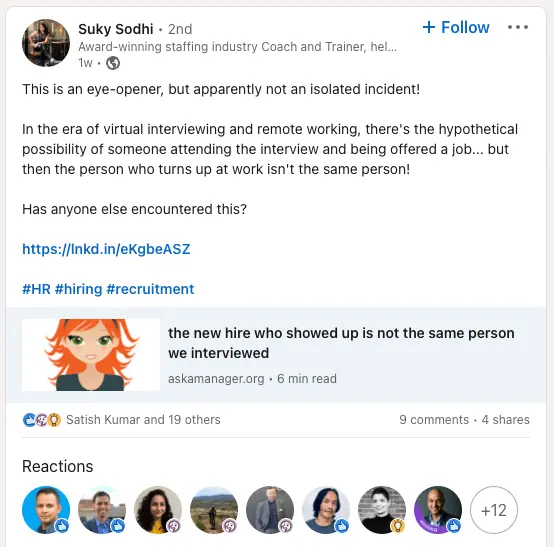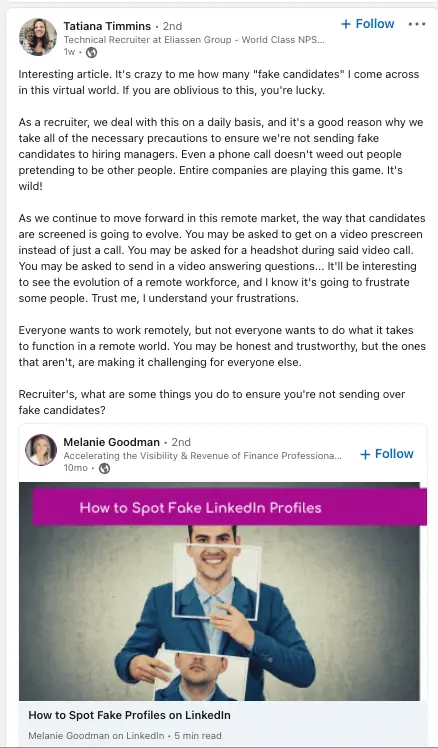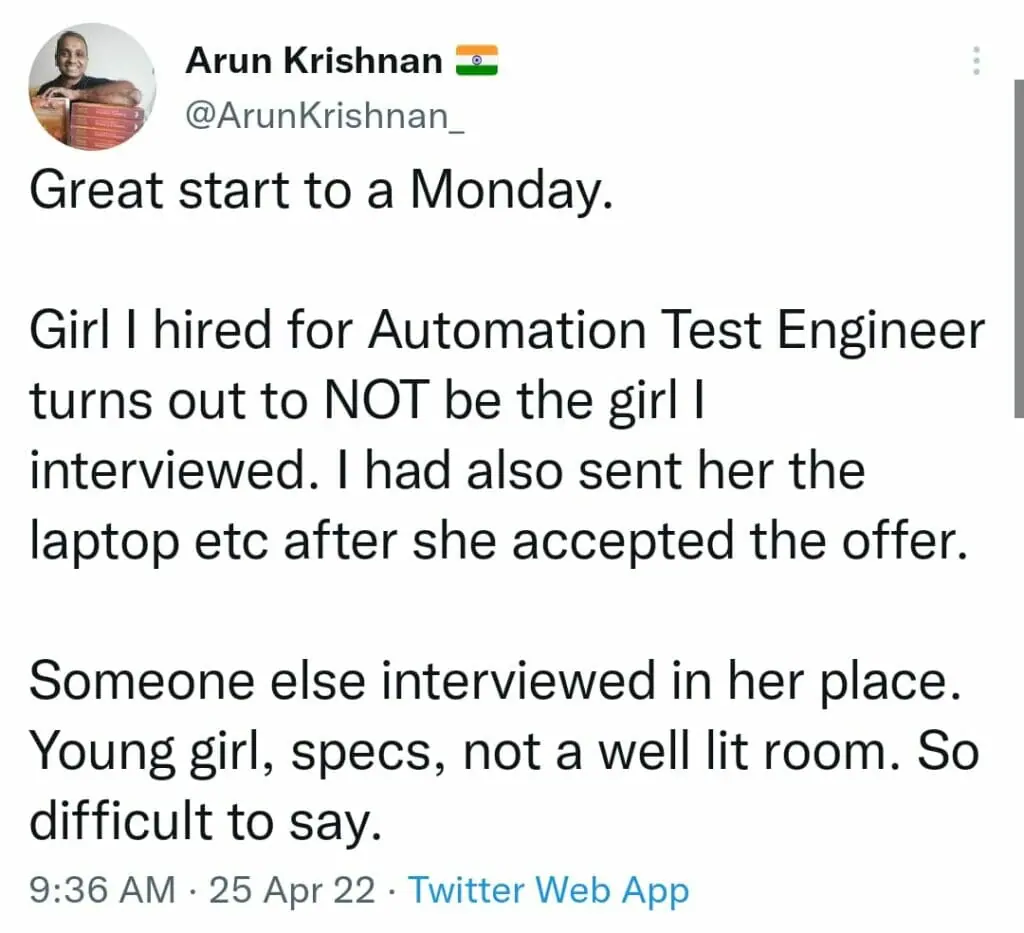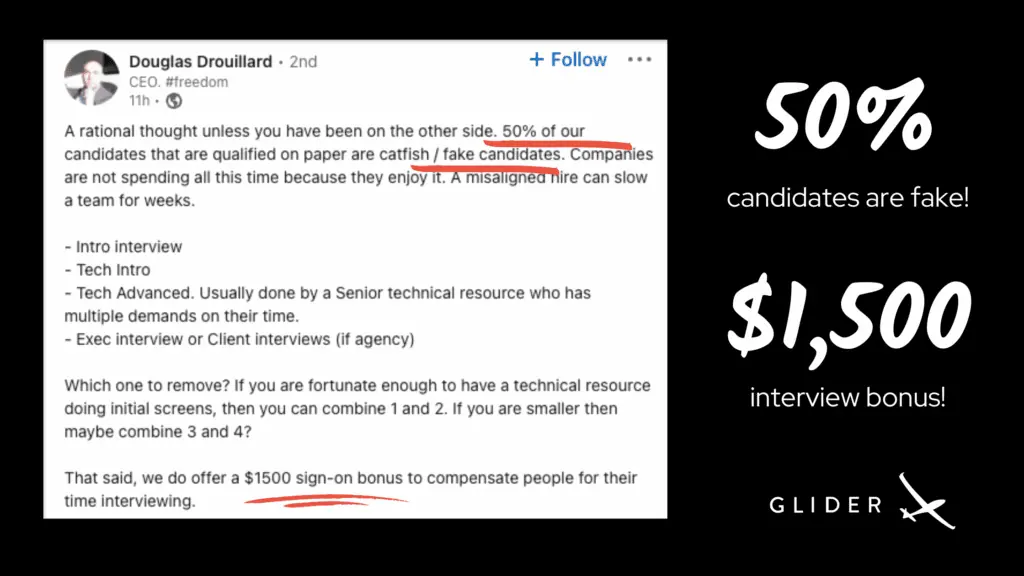With remote work the new normal, professional interviewers and fake candidates are growing at alarming rates and increasing in sophistication. What options are there for recruiters and hiring managers?
Since COVID-19, remote work and remote hiring have soared, and it’s more than a pandemic-exclusive phenomenon.

Remote work has forever changed how we work and how companies hire and keep employees. There’s an endless supply of stats touting the benefits of a remote-first world, like:
While remote work has major benefits for everyone, there are negatives, especially during the remote interview and remote hiring process.
Candidate fraud is growing at an alarming rate, whether it’s misrepresenting skills or experiences on a resume to professional interviewers interviewing for someone else. In fact, we discovered a 92% increase in candidate fraud from the onset of the COVID-19 pandemic.
Not only did our AI pick up the increase in candidate fraud attempts, but recruiters and hiring managers are sharing their fake candidate experiences, take the examples below.
Suku Sodhi, Founder of Elite Global Recruiters shares her fake candidate experience on LinkedIn:

In another LinkedIn post, Tatiana Timmins, Technical Recruiter at Eliassen Group shares her experience with fake candidates:

How do candidates cheat?
Remote hiring and remote work have created an environment where cheating is perceptively easier and with growing sophistication. Here are some of the few examples where companies have observed candidate cheating:
- Bait and switch: the person interviewed and hired isn’t who shows up for the job
- Lip syncing: precisely what you’d expect; someone else in the room provides the answers while the person interviewed moves their lips
- Plagiarism: in the case of employment tests, answers to questions are copied and pasted from online sources
- Back-up: either someone else in the room is feeding answers, or there’s a cheat sheet out of sight of the interview camera
- Virtual Access: another person takes the test or interview via a dual keyboard and monitor
- Remote desktop: another person takes the candidate employment test for them via Zoom, TeamViewer, or another remote access tool
- Headphones: often the candidate is guided over a phone call with answers to interview questions
Accounts of “candidates behaving badly” even made it to a recent New York Times article, take this excerpt into consideration:
Remote hiring processes have given some job seekers the impression that they can get away with extreme forms of dishonesty. Virtual interviews leave open the possibility that candidates can ask a friend to feed them answers. Telephone calls can create a psychological distance between the interviewer and interviewee, Dr. Feldman noted, which may make it easier for people to justify presenting themselves in an inaccurate way. At the same time, people are doing far more interviews than before, with about one in five employees voluntarily switching jobs in 2020.
New York Times
How to spot if the candidate is cheating?
Not all candidate fraud attempts are done with malicious attempts, as shared in the New York Times article above, there are psychological explanations for why this is happening at alarming rates. Here are a few of the telltale signs that something suspicious is happening during the interview:
- Zoom/remote desktop icon on the screen
- Dual cursors while taking the test
- Zoom or Skype icon or TeamViewer icon on the taskbar
- Note the candidate’s body language and see if anything is unusual
- Excessive background noises
- Too much lighting or not enough lighting is usually a sign that they are hiding something or someone in the room
- Speaker echoes because two computers are picking up sound
- Extreme candidate nervousness, such as excessive sweating, etc
- Coughing or clearing of the throat because of throat drying up (usually happens while lying)
- Grainy video due to compromised computer bandwidth, typically due to remote desktop access
- Delayed responses to questions could be a sign someone else is providing answers
- Look for the eye and cursor movements if they are in sync
- Look for eye, hand, shoulder and cursor movements while the candidate is writing the code.
- Look for the candidate’s eye movement if they are frequently looking away from the system
- Check if the candidate looks at the keyboard while typing the characters
Arun Krishnan shares how he was duped by a fake candidate to his 11k + followers:

How do you prevent fake candidates, interview fraud, and employment test cheating?
Most interview and hiring processes were not made for remote work and remote hiring:
- Resumes don’t reveal soft skills or communication abilities
- Traditional video interview formats are wrought with bias
- We all have our core job responsibilities that go beyond interviewing
- Expecting a subject matter expert to validate competency for every interview is costly and often unrealistic
Douglas Drouillard, CEO of Shrine Development shares his perspective on LinkedIn regarding interview time and compensation.

And, on the other end of the spectrum, Rashad Morton, Tech talent at Accenture details his experience as an interviewee.

So how can recruiters and hiring managers embrace the new remote work / remote hiring model?
If you’re not re-evaluating your interview to hire process, you’re exposing your company to incredible risk. Make sure you download our latest research where we provide insights into what leading organizations are doing to hire qualified candidates in a remote-first work environment.



